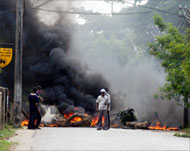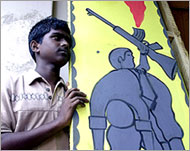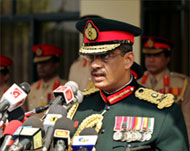Upsurge in Sri Lanka violence
A sudden upsurge in violence is rocking an already tenuous truce between the government and Tamil Tiger rebels in Sri Lanka.

On Thursday, Tamil rebels attacked two Sri Lankan naval craft off the island’s northwest coast, capturing three sailors in the most violent incident at sea since a 2002 truce, the navy said.
Another sailor was wounded in the attack and was described as being in critical condition.
Sea Tigers – the naval wing of the rebels – hid among a fishing fleet and opened fire on two approaching naval dinghies, capturing three sailors who jumped into the water, according to Commodore Jayantha Perera, a navy spokesman.
“They have come as fishermen and attacked the Navy craft,” he said. “In retaliation we have also attacked and captured six Liberation Tigers of Tamil Eelam (LTTE) cadres. This is the worst incident for the navy since the ceasefire. This is the first time they have fired on us.”
Navy attacked
The clash took place just off the northwestern district of Mannar, close to a string of islands linking Sri Lanka to India, the navy said. An operation was under way to rescue the captured sailors, it added.
Also on Thursday, suspected Tamil Tiger rebels, armed with grenades attacked a Sri Lankan military roadblock in the northern city of Jaffna, wounding a police sergeant and two civilians, the defence ministry said.
Soldiers opened fire on the attackers; but it was not immediately clear if the rebels suffered any casualties, said a military official on customary condition of anonymity.
On Wednesday, the Tigers were blamed for an attack that left one Sri Lankan soldier dead and another wounded another in the government-held north, the army said, as prospects for direct peace talks looked increasingly remote.
 |
|
Rebel attacks on troops have |
The LTTE – who control a seventh of Sri Lanka in the north and east where they want to set up an independent Tamil homeland – were unavailable for comment.
Mounting attacks on troops in government-held areas has been straining the ceasefire to its limit and fears are increasing of a return to the two-decade war between government and rebels which has claimed more than 64,000 lives.
Stock market jolted
Sri Lanka‘s stock market, made increasingly jumpy by recent attacks on troops in the minority Tamil-dominated north but still hopeful that peace talks will begin, slumped on the news. At 0611 GMT the Colombo All-Share was down 1.17%.
“It’s very worrisome,” said Jehan Perera of the National Peace Council, a non-partisan peace advisory group. “This is another step on the path to a return to war.”
Earlier this month, 14 soldiers were killed in mine attacks on the northern Jaffna peninsula – a government enclave hemmed in by rebel lines – in the biggest breaches of the ceasefire so far.
The rebels deny carrying out any of the recent attacks, but say they will return to war in 2006 if the government does not offer them some way forward in the peace process.
Emergency talks
 |
|
The Tamil rebels deny any role |
The two sides have failed to agree on a venue for emergency talks. The rebels have rejected a Japanese offer to host talks, while officials say Mahinda Rajapakse, the Sri Lankan president, is unlikely to accept the rebel demand that a meeting be held in Norway.
Norway, Japan and the United States – co-chairs of a group monitoring Sri Lanka‘s peace process – called on the Tigers this week to end their “campaign of violence” immediately or face unspecified “serious consequences”.
However, both sides – the army and the rebels – accuse each other of trying to escalate the situation. The rebels deny involvement in the recent attacks, as well as other incidents including an apparent attempt last week to shoot down a military helicopter.
“LTTE is determined to uphold the ceasefire agreement, but the Sri Lankan Army is continuously ignoring it and are committing serious violations, such as rapes, violent attacks and humiliating treatment of Tamil civilians,” the rebels’ official website quoted Jaffna political head Illamparuthy as telling Nordic truce monitors.
The army – which lost 14 dead earlier this month in two claymore fragmentation mine attacks in the area in the biggest breaches so far of the 2002 ceasefire – said rebels were occasionally shooting openly across no-man’s land.
“This isn’t a ceasefire,” said a Colombo-based foreign diplomat. “But there’s still a big gap between this and a full-scale war.”
Human rights violations
 |
|
Rebels have accused the army of |
Diplomats say Erik Solheim, the Norwegian mediator, and Yasushi Akashi, the Japanese peace envoy, both met separately with Anton Balasingham, the chief rebel negotiator, in London after the Brussels meeting, but with little progress.
According to them, Balasingham said the rebels wanted peace, but he was also accusing the army of human-rights abuses in Jaffna and wanted troops pulled back. That demand is repeated by groups in the north who analysts say are almost certainly rebel fronts.
“We the Tamil people have decided to take matters into our own hands,” the High Security Zone Residents’ Liberation Force said in a faxed statement.
“We shall in due time make sure that our women can feel safe in their homes and villages by using all means necessary to drive out the criminals who are occupying our homeland.”